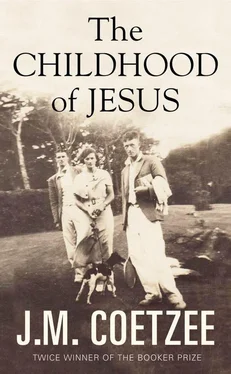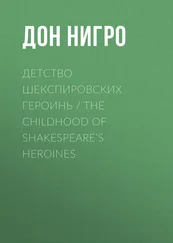He misses the boy. Waking up the next morning with the empty weekend before him is like waking after surgery to find a limb has been cut off — a limb or perhaps even his heart. He spends the day drifting about, killing time. He wanders around the empty docks; he roams back and forth across the parklands, where hosts of children are throwing balls or flying kites.
The feel of the boy’s sweaty little hand in his is still vividly alive to him. Whether the boy loved him he does not know, but certainly he needed and trusted him. A child belongs with his mother: he would not for a moment deny that. But what if the mother is not a good mother? What if Elena is right? Out of what complex of private needs did this Inés, of whose history he knows not a jot, grasp a chance to have a child of her own? Perhaps there is wisdom in the law of nature which says that, before it can emerge into the world as a living soul, the embryonic being, the being-to-be, must for a term be borne in its mother’s womb. Perhaps, like the weeks of inwardness that the mother bird spends sitting on her eggs, a period of seclusion and self-absorption is necessary not only for an animalcule to turn into a human being but also for a woman to turn from virgin into mother.
Somehow the day passes. He thinks of calling in at Elena’s, then at the last minute changes his mind, unable to face the nagging interrogation that awaits him there. He has not eaten, has no appetite. He settles down on his bed of sacks, restless, fretting.
The next morning, at the crack of dawn, he is at the bus station. An hour passes before the first bus arrives. From the terminus he follows the uphill track to La Residencia, to the tennis court. The court is deserted. He settles down to wait.
At ten o’clock the second brother, the one he has not yet had the pleasure of being introduced to, arrives in his whites and begins to set up the net. He pays no attention to the stranger in plain sight not thirty paces away. After a while the rest of the party makes its appearance.
The boy sees him at once. In his knock-kneed way (he is an awkward runner) he dashes across the court. ‘Simón! We are going to play tennis!’ he calls out. ‘Do you want to play too?’
He grips the boy’s fingers through the mesh. ‘I’m not much of a tennis player,’ he says, ‘I’d rather watch. Are you enjoying yourself? Are you getting enough to eat?’
The boy nods vigorously. ‘I had tea for breakfast. Inés says I am big enough to drink tea.’ He turns and calls out, ‘I can drink tea, can’t I, Inés?’ then without a pause plunges on: ‘And I gave Bolívar his food and Inés says we can take Bolívar for a walk after tennis.’
‘Bolívar the Alsatian? Please be careful around Bolívar. Don’t provoke him.’
‘Alsatians are the best dogs. When they catch a thief they never let go. Would you like to watch me play tennis? I’m not very good yet, I have to practise first.’ With that he whirls around and dashes back to where Inés and her brothers stand conferring. ‘Can we practise now?’
They have outfitted him in brief white shorts. So, with the white blouse, he is all in white, save for the blue shoes with the straps. But the tennis racquet they have given him is far too large: even with two hands he can barely swing it.
Bolívar the Alsatian slinks across the court and settles down in the shade. Bolívar is a male, with huge shoulders and a black ruff. In looks he is not far removed from a wolf.
‘Come here, big man!’ calls Diego. He stands over the boy, his hands enclosing the boy’s hands as they hold the racquet. The other brother lobs a ball. Together they swing; they hit the ball cleanly. The brother lobs another ball. Again they hit it. Diego backs away. ‘There’s nothing I can teach him,’ he calls to his sister. ‘He is a natural.’ The brother lobs a third ball. The boy swings the heavy racquet and misses, almost falling over in the effort.
‘You two play,’ calls Inés to her brothers. ‘David and I will go and throw balls.’
With easy competence the two brothers knock a ball back and forth over the net, while Inés and the boy disappear behind the little wooden pavilion. He, el viejo , the silent watcher, is simply ignored. It could not be made more clear that he is unwanted.
He has vowed to keep his woes to himself, but when Álvaro asks a second time what has become of the boy (‘I miss him — we all miss him’), the whole story comes pouring out.
‘We went searching for his mother and — behold! — we found her,’ he says. ‘Now the two of them are reunited, and they are very happy together. Unfortunately the kind of life Inés has in mind for him doesn’t include hanging around the docks with the menfolk. It includes nice clothes and good manners and regular meals. Which is fair enough, I suppose.’
Of course it is fair enough. What right has he to complain?
‘It must come as a blow to you,’ says Álvaro. ‘The youngster is special. Anyone can see that. And you and he were close.’
‘Yes, we were close. But it’s not as if I won’t see him again. It’s just that his mother feels that he and she will restore their bond more easily if I stay out of the picture for a while. Which, again, is fair enough.’
‘Indeed,’ says Álvaro. ‘But it does ignore the urgings of the heart, doesn’t it?’
The urgings of the heart : who would have thought Álvaro had it in him to talk like that? A man strong and true. A comrade. Why can he not bare his heart frankly to Álvaro? But no: ‘I have no right to make demands,’ he hears himself say. Hypocrite! ‘Besides, the rights of the child always trump the rights of grown-ups. Isn’t that a principle in law? The rights of the child as bearer of the future.’
Álvaro gives him a sceptical look. ‘I’ve never heard of such a principle.’
‘A law of nature then. Blood is thicker than water. A child belongs with his mother. Particularly a young child. By comparison, my claims are very abstract, very artificial.’
‘You love him. He loves you. That isn’t artificial. It’s the law that is artificial. He should be with you. He needs you.’
‘It’s good of you to say so, Álvaro, but does he truly need me? Perhaps the truth is, I am the one who needs him. Perhaps I lean on him more than he leans on me. Who knows how we elect those we love anyway? It is all a great mystery.’
That afternoon he has a surprise visitor: young Fidel, who arrives at the docks on his bicycle, bearing a scrawled note: We have been expecting you. I hope there is nothing wrong. Would you like to come to dinner this evening? Elena.
‘Say to your mother, Thank you, I’ll be there ,’ he tells Fidel.
‘Is this your work?’ asks Fidel.
‘Yes, this is what I do. I help to load and unload ships like this one. I’m sorry I can’t take you on board, but it is a bit dangerous. One day when you are older, perhaps.’
‘Is it a galleon?’
‘No, it doesn’t have sails so it can’t qualify as a galleon. It is what we call a coal-fired ship. That means it burns coal to work the engines that make it go. Tomorrow they will be loading coal for the return voyage. That will be done at Wharf Ten, not here. I won’t be involved. I’m glad of it. It’s a nasty job.’
‘Why?’
‘Because coal leaves black dust all over you, including in your hair. Also because coal is very heavy to carry.’
‘Why can’t David play with me?’
‘It’s not that he can’t play with you, Fidel. It’s just that his mother wants him to herself for a while. She hasn’t seen him in a long time.’
‘I thought you said she had never seen him.’
Читать дальше












